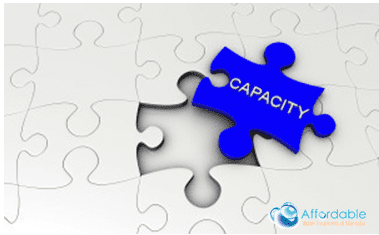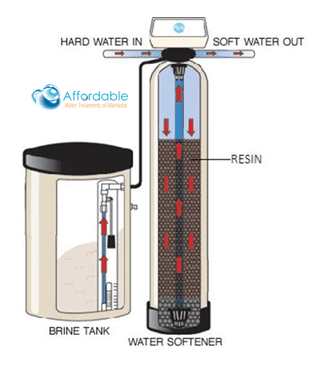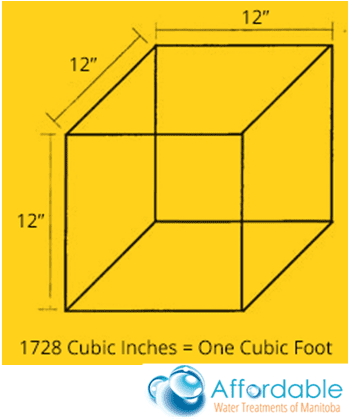
What Does Water Softener Capacity Mean?
Water softener capacity is the amount of hardness that a softener can remove before it must go through a regeneration cycle. As your home’s water flows through the softener, the softening resin grabs onto hardness minerals, Calcium & magnesium, removing them from going into your home. Eventually, the resin runs out of room for the hard minerals and can no longer soften any more water. The water softener then regenerates, in other words, cleans itself out by flushing the minerals into the drain line using the brine solution from the brine tank to complete this process.

How to Understand Water Softener Capacity
Water softeners don’t come in small, medium, and large like many other products. Instead, the water softener industry has historically described water softener size in terms of grain capacity.
But before we dig into this, we need to know what a ‘grain’ actually is. A grain is a unit of weight. One grain equals about 65mg – about the same weight as a grain of wheat or barley, which is where it gets its name. The grain capacity of a water softener is the weight of hardness minerals the softener can remove before it needs to regenerate.
If you’ve done any browsing for water softeners online, or in stores, you’ve likely seen many softeners described by their grain capacity. Common sizes are 30,000 / 45,000 / 60,000-grain softeners. The 30,000 / 45,000 / 60,000-grain capacity values that are assigned to most water softeners are the maximum theoretical capacities. What these numbers really refer to is the number of cubic feet of resin in each unit. The hardness in your water along with the size of your family will determine how many cubic ft. you will need in your softener.

30,000 = 1.0 cubic ft.
45,000 = 1.5 cubic ft.
60,000 = 2.0 cubic ft.
When you purchase a water softener that is too small for your home it will actually cost you more money for salt in the long run, and may not keep up to household water needs. Below is a what a typical salt setting is for the sizes provided:
9 lbs salt = 30,000 grains softening capacity
13.5 lbs salt = 45,000 grains softening capacity
18 lbs salt = 60,000 grains softening capacity
The other thing to remember about capacity is that a water softener is always set to only 80% of its maximum. The reason we do this is that if we run out of soft water at 10 am you still have a 20% pillow which will get you through the day. Most water softeners are set to regenerate at 2 am when people are sleeping and there is no water usage.
If there is a small amount of iron in the water you can sometimes raise the salt setting on the regeneration to remove it. There are also other minerals that can affect the performance of a water softener in rare cases but it’s not the norm.
